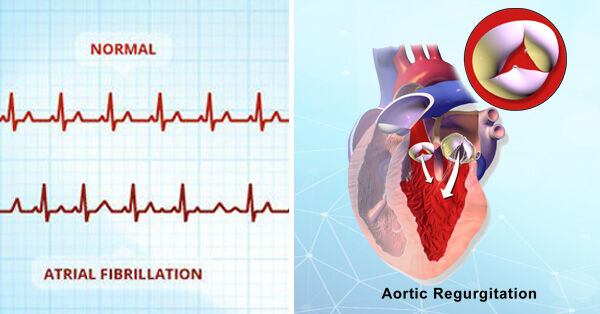Atrial Fibrillation & Aortic Regurgitation: What 9 Facts Should Patients Know?
Written By: Adam Pick, Patient Advocate, Author & Website Founder
Medical Expert: Dr. Niv Ad, Atrial Fibrillation Specialist
Published: September 2, 2020
I just received a great question from Gabe about aortic valve regurgitation and atrial fibrillation. In his email Gabe asked me, “Hi Adam, Is it common or uncommon for a patient with aortic regurgitation to experience AFIB? Why or why not?”

I wanted to provide Gabe an expert response to his questions. So, I contacted Dr. Niv Ad, a leading cardiac surgeon at White Oak Medical Center in Silver Spring, Maryland.
 Dr. Niv Ad
Dr. Niv Ad
Dr. Ad is a world-renowned expert in atrial fibrillation and heart valve disease who has published over 175 research articles in peer-reviewed publications.
1. What is atrial fibrillation?
Atrial fibrillation is an electrical abnormality that causes the atria (upper chambers of the heart) to fibrillate, or quiver, rather than contract. Over time, atrial fibrillation can cause symptoms and serious risks for patients.
Atrial Fibrillation (AFib) is the most common arrhythmia in adult patients. AFib impacts approximately 1.5% to 2% of the general population.
There are different statistics for how common AFib is. The most accepted incidence of AFib is about 5% for patients over the age of 65 years. As our population ages (e.g. the Baby Boomers), studies suggest that the burden of AFib will surge up to 300% by 2030 to over 12 million cases.

2. What are the symptoms of atrial fibrillation? Causes? Risks? Treatments?
Patients with Atrial Fibrillation are commonly symptomatic. However, patients can also be asymptomatic (without symptoms).
The most common symptoms are:
- Heart palpitations
- Shortness of breath
- Dizziness
- Anxiety
- Fatigue
According to the National Institutes of Health, two serious complications associated with AFib are stroke and heart failure. Importantly, AFib can result in decreased longevity for patients.
There are several other treatments for AFib including medication (as referenced above), cardioversion, catheter ablation and surgical ablation, also known as the Maze Procedure.
3. What should patients know about AFib and Stroke?
Specific to stroke… in certain risk subgroups patients in AFib is 5 times more likely to have a stroke than a patient without AFib, according to the American Heart Association.
To help reduce the risk of stroke, doctors often prescribe AFib patients blood thinners such as Warfarin or Direct Oral Anticoagulants (DOAC) (e.g. Eliquis) which can reduce the risk of a stroke but not eliminate it. It should be noted that blood thinners are associated with an increased risk for bleeding.
4. Is there a known association between atrial fibrillation and heart valve disease?
Yes, there is a strong association between heart valve disease and atrial fibrillation.
The most common link between heart valve disease and AFib is specific to the mitral valve. However, other valve pathologies – such as aortic valve disease – can also present with AFib especially when the patient’s left atrium has higher pressures and is dilatated (or enlarged).
Atrial fibrillation can be the first sign for a decompensated heart in patients with valve disease.
5. Is it common that patients with aortic valve regurgitation experience atrial fibrillation?
Gabe asks a very interesting and important question. I am not aware of an exact statistic for the prevalence of atrial fibrillation and aortic insufficiency, a leaking aortic valve.
However, a diagnosis of aortic regurgitation and atrial fibrillation is very important for patients to watch out for. This diagnosis may be an indicator that surgical treatment needs to be done sooner-than-later to prevent farther deterioration and any unwanted risks for the patient.
6. Do all patients with aortic regurgitation and AFib need treatment?
In medicine there is never an “all” or “always”.
Clinical judgment and experience are the most important aspects of any surgical intervention. The key for patients is to get an opinion from a specialist that has a lot of experience with both heart valve and AFib procedures.
While most surgeons can operate on the aortic valve, many choose not to treat atrial fibrillation at the time of the aortic valve surgery. In fact, only 20% to 25% of patients that have aortic valve surgery get their AFib treated.
This is a significant concern as there are medical guidelines that recommend the treatment of aortic valve and atrial fibrillation at the same time.
7. What should patients know about concomitant Aortic Valve & AFib Procedures?
Aortic valve disease and AFib can be treated at the same time. This is called a concomitant procedure. Treating the AFib at the time of surgery may extend its length, but without increased risk for patients. As mentioned above, many times the AFib is simply “left behind”.
Here is why this is such a big deal for patients:
- Patients left in AFib have worse prognosis compared to those that were treated during a concomitant procedure.
- Surgical ablation at the time of aortic valve replacement is not associated with increased complications.
- In most cases, a full “Maze Procedure” is needed as most of aortic valve patients have enlarged left atrial and non-paroxysmal atrial fibrillation
8. How is surgical ablation, the Maze Procedure, used to treat AFib during a concomitant procedure?
To treat the AFib, the surgeon should perform the appropriate surgical ablation, and in case of aortic valve disease most often the Maze Procedure, at the time of an aortic valve replacement. During a Maze Procedure, bipolar radiofrequency and cryoablation systems are used to heat and freeze heart tissue to create permanent scars in a specific pattern to block abnormal electrical conduction.
As a result, patients may no longer have abnormal heart rhythms and if safe patients may be able to stop using anticoagulants in coordination with their doctor.
Here’s a video animation that shows how surgeons perform a full Maze procedure.
9. What is your number one piece of advice for patients with aortic regurgitation and AFib?
My advice to Gabe and all patients is…
Please do not overlook the importance of the treatment of AFib at the time of aortic valve replacement. The Maze Procedure may give you better long-term longevity and a much improved quality-of-life.
Thanks Gabe! Thanks Dr. Ad!
I hope this helped Gabe (and perhaps you) learn more about aortic insufficiency and atrial fibrillation. Many thanks to Gabe for his question! And, a special thanks to Dr. Niv Ad for sharing his research and clinical experiences with our community!
Keep on tickin!
Adam



